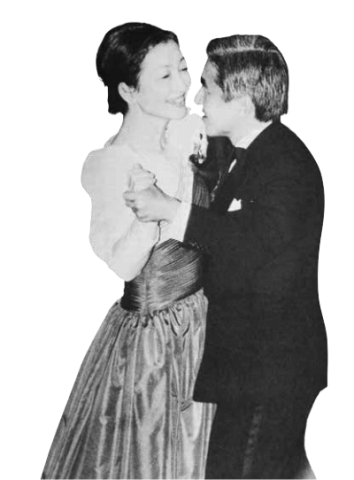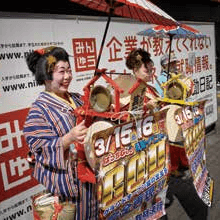Issue:
It was a dull, overcast autumn day in Tokyo. The occasional breeze stirred the falling leaves and the only brightness was the vivid yellow of the ginkgo trees outside the Yurakucho Denki Building.
I barely noticed, preoccupied as I was with the Club’s 40th anniversary party set for Nov. 29, just four days away. As event committee chair, I had much on my mind. Bookings had slowed to a halt and it looked that we might be lucky just to break even. At one time, we had pinned our hopes on the crown prince and princess accepting our invitation, hand delivered in September; two months later, not a word had been heard.
But later that morning, a breathless and excited Jurek Martin, Financial Times bureau chief and FCCJ president, phoned me. “We’re wanted at the palace,” he said. “Now.”
So off we went with Nobuyoshi Yamada, then the Club’s administration, liaison and protocol chief, not to the Imperial Palace but to the Crown Prince Department of the Kunaicho, the Imperial Household Agency, to discuss the invitation. They had decided that the couple would attend.
Elated, we set about revising some of the details, so as to appropriately accommodate our royal guests. This meant coordination with the Kunaicho, the police and the Capitol Tokyu Hotel, where the event was to be held. We explained about the participants, including the entertainment the bands and other performers. Among them were a troupe of English speaking Noh actors and a group of chindonya, the elaborately dressed downtown street musicians who are hired to make a racket outside a new noodle shop, for example, to attract custom. I had thought that these onomatopoeically named musicians would be just the ticket to promote the sales of raffle tickets on the night of the gala.

The crown prince and princess dancing at the Club’s 40th anniversary celebrations – the day he first witnessed chindonya.
News that Their Imperial Highnesses would attend spread fast, followed by a rush of late bookings. What had looked like a possible loss maker suddenly appeared to be heading into the black. Even Prime Minister Yasuhiro Nakasone, who had earlier declined our invitation, suddenly found his diary had a 10 minute slot enabling him to drop in for a drink to toast the Club’s anniversary.
Then, out of the blue, one of the Club’s senior Members called me, advising me to pull the chindonya from the event. There were some elements in Japanese society who would not take kindly to their low brow presence, he said, and it would be better “to avoid any unpleasantness.” Such a “common, blue collar pleasing street performance could be taken as an insult to the royal couple,” he said.
What to do? I consulted Ryozo (Smiley) Matsuoka, our indefatigable F&B manager and an expert in diplomacy at the time. We called the Kunaicho to seek their advice. “It’s your party,” we were told. “We are the guests.” That seemed clear enough, so we gave the green light to the chindonya.
The musicians performed as intended throughout the dinner, with their chins chinning and dons donging as they were supposed to. The only complaint we received was from an unhappy attendee who thought the raffle tickets were too expensive.
During the desserts and coffee, Club president Jurek’s wife, Kathleen, came from the head table with a request that the crown prince wanted to speak with me. With butterflies in my stomach I went to meet His Imperial Highness, who quickly put me at my ease with a slight bow and a big, warm smile.
“I understand you made the arrangements for this party,” he said.
“No, no.” I said, “There was a committee . . . many were involved.”
“I meant arranging the chindonya,” said the crown prince. “That is true,” I said. “I wanted to sell raffle tickets and thought they would attract sales.”
“I GUESS YOU COULD SAY I AM A WHITE-COLLAR CHINDONYA,” I FEEBLY JOKED.

Chindonya are still employed to drum up business.
“Thank you Mr. Tudor,” said the prince. “This is the first time I have ever seen chindonya in action. Thank you very much.” He was charm itself, and his English was flawless.
He asked what I did at Japan Airlines, where I was a member of the public relations department looking after international media relations, and I gave a brief description of my labors.
“I guess you could say I am a white collar chindonya,” I feebly joked. The Prince smiled, as if he understood.
Whatever else happened that night was soon a blur. The party was a huge success, thanks to the Imperial couple, who were photographed for the first time dancing together. The media coverage was enormous. The AP photo of the happy couple (opposite) hangs over the stairs to the library in the new Club.
That night’s brief conversation remains one of my most treasured memories. To this day, I feel immensely proud of my time as the humble purveyor of chindonya to the man who would become the Heisei Emperor.
Geoffrey Tudor covers aviation for several publications and is North Asia Correspondent for Orient Aviation magazine.

